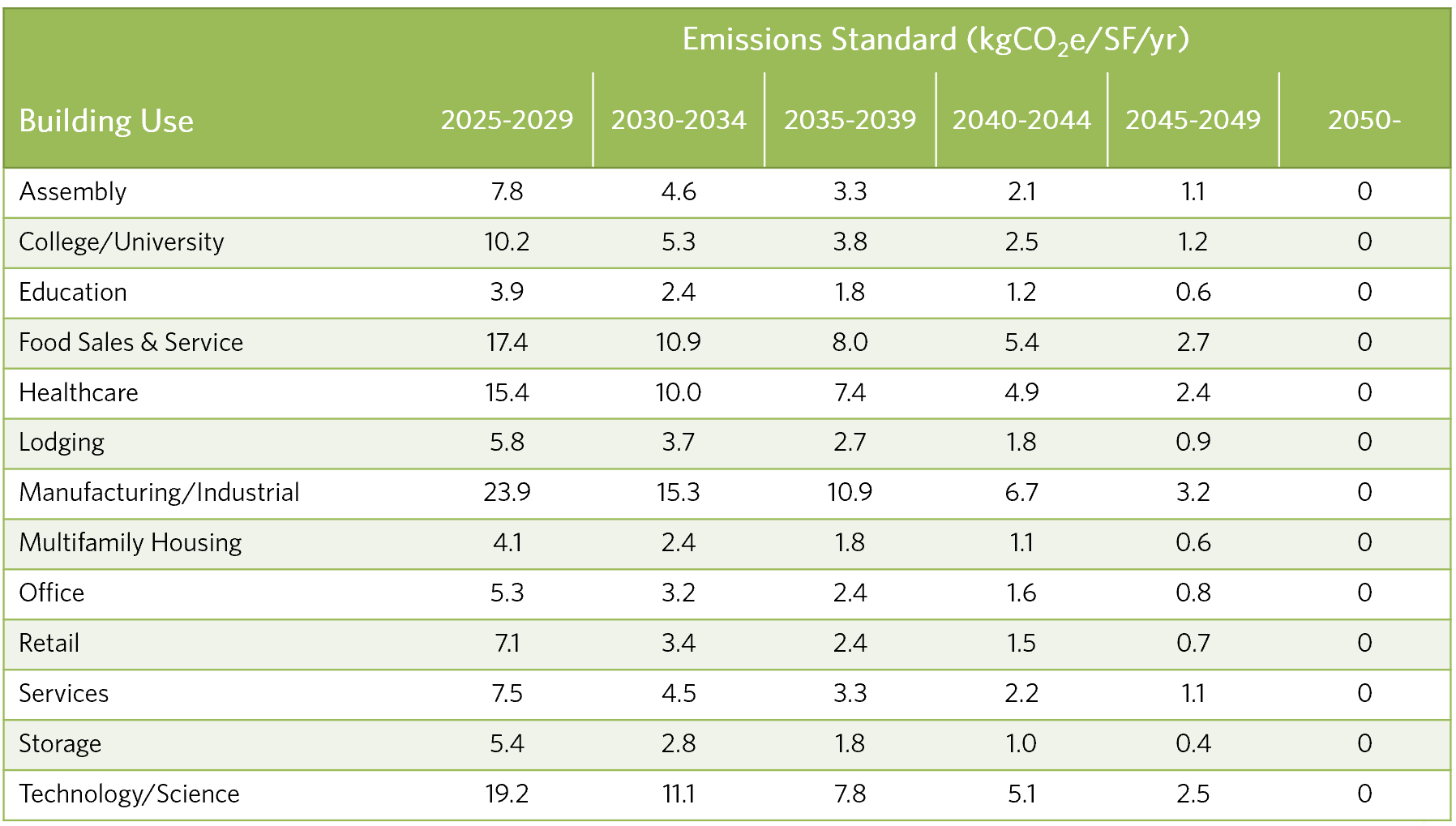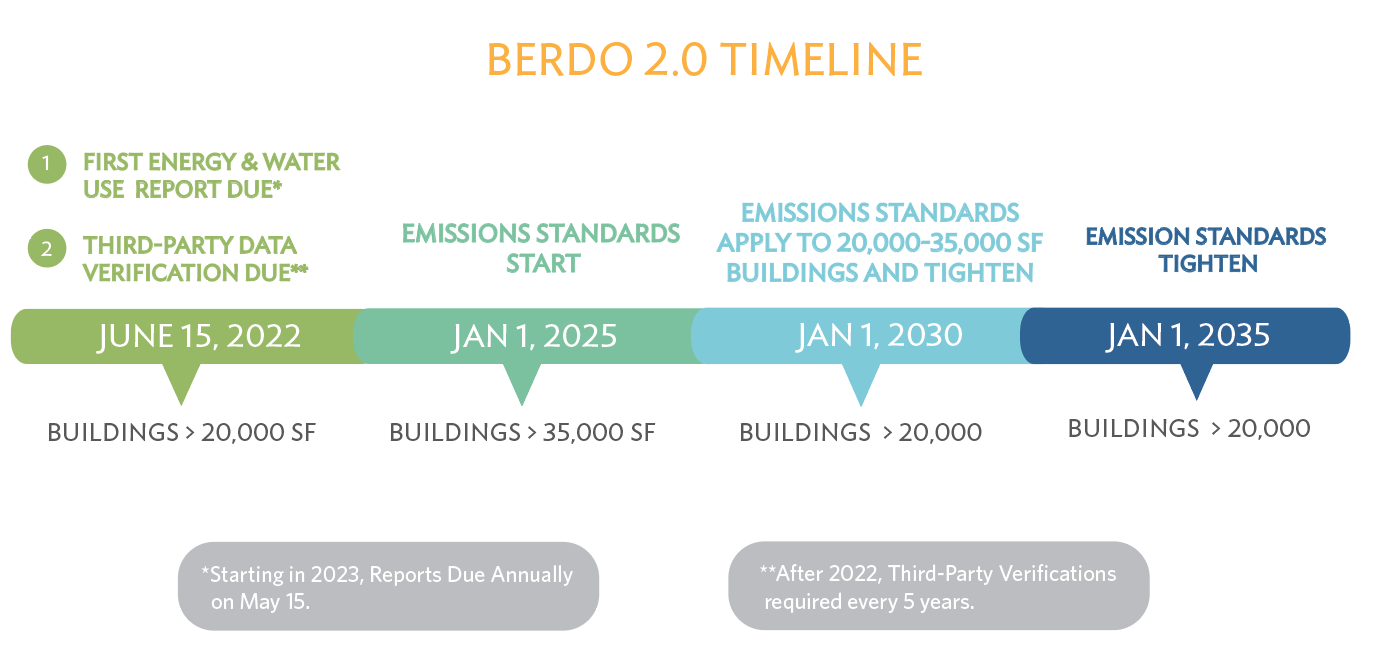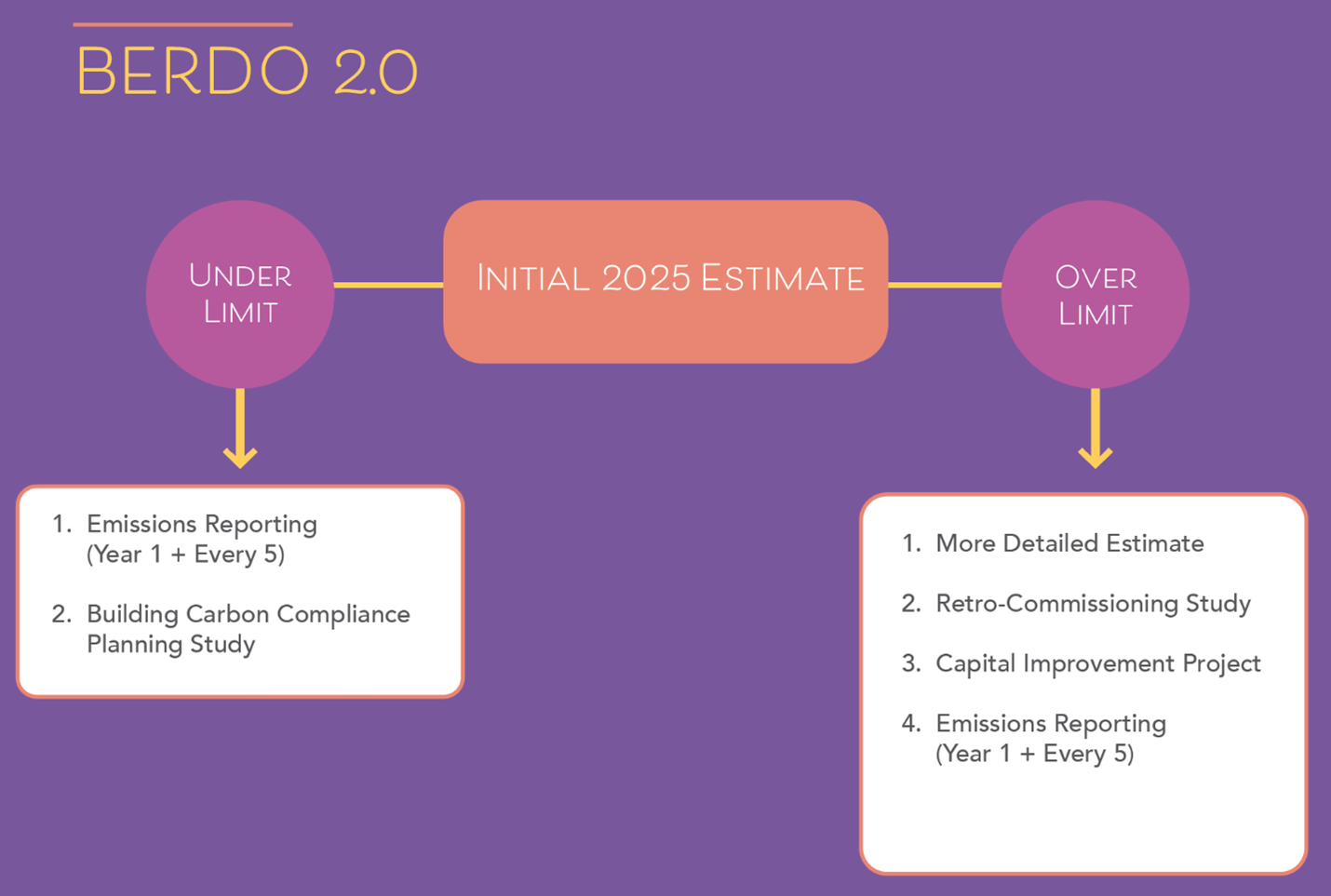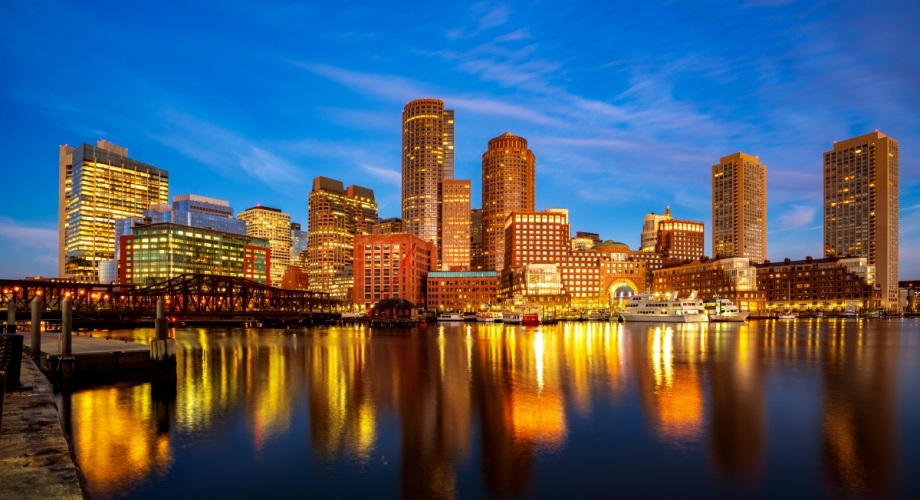BERDO 2.0 is a landmark ordinance set to drive decarbonization in Boston's building sector by establishing mandatory carbon emission standards and requiring yearly energy and emissions data reports. To avoid costly fines, building owners need to prepare for the reporting requirements starting this year and consider strategies to meet upcoming emissions limits.
Bala’s team of integrated sustainability, energy, and commissioning engineers understand the implications of BERDO 2.0 for building owners. We work with owners to identify the best strategies for their buildings to meet the emissions requirements and report results.
Legislation Background
BERDO 1.0, the original City of Boston ordinance passed in 2013, stands for Building Energy Reporting and Disclosure Ordinance. This required non-residential buildings over 35,000 SF and residential building over 35,000 SF or 35+ units to report energy and water use to the city. The new BERDO 2.0, enacted in September 2021, stands for Building Emissions Reduction and Disclosure Ordinance.
Notice the switch from “Energy Reporting” to “Emissions Reduction”. The City of Boston has expanded their previous ordinance to now include carbon emissions reduction – with limits being enforced – and requirements for buildings of an even smaller size.
What Buildings Are Impacted by BERDO 2.0?
BERDO 2.0 now sets upcoming carbon emissions limits and requires annual reporting for the following buildings:
- Non-Residential greater than 20,000 SF (buildings 20,000-35,000 SF are newly included)
- Residential greater than 20,000 SF or 15+ units (buildings 20,000-35,000 SF and 15-35 units are newly included)
June 15th, 2022 was the initial deadline for all buildings over 20,000 SF to report their energy and water usage. However in 2022, all building owners are entitled to apply for a one-time, six-month extension. December 15, 2022 is the deadline for reporting and verification with extension.
In 2023 and every year thereafter, buildings must report by May 15th. The City of Boston has set three main components for reporting in 2022:
- Energy Star Portfolio Manager: The Environmental Protection Agency’s (EPA) Energy Star Portfolio Manager (ESPM) is used for reporting key building characteristics in addition to energy and water usage.
- BERDO Reporting Form: A new requirement in 2022, this form captures data required for BERDO 2.0 that isn’t included in ESPM.
- Third Party Data Verification: Third-party data verification is a new requirement of BERDO 2.0 and must be completed by a “qualified energy professional”
The most groundbreaking aspects of BERDO 2.0 are the upcoming building emissions standards. Beginning in 2025, buildings over 35,000 SF are required to include carbon emissions within their annual reports. Emissions will be calculated on a per square foot basis and measured against the city’s Emissions Standards (units are kg CO2e/SF/year) showcased in the table below. Emissions Standards vary by building use and become increasingly stringent every 5-years , until reaching carbon neutrality – zero carbon emissions – in 2050.

Buildings 20,000-35,000 SF will not need to comply with emissions standards until 2030, reporting emissions for the first time in 2031.
A “Qualified Energy Professional” must provide a Third-Party Data Verification for the first year of reporting and every 5 years after that. Bala has qualified energy professionals in house to perform these mandatory verifications. Factors that must be included in the report and determine compliance or non-compliance include:
- Energy & Water Use
- Primary Building Use
- Renewable Energy Credits (RECs)
- Power Purchase Agreements (PPAs)
- CO2 Emissions Factors (if different than given)
- Contact Information: Owner & Designated Agents (for reporting only)
As a point of note, emergency backup is currently exempt from reporting. However, that may change after 2030. The ordinance is still evolving, and this portion of the reporting may change with time.

Penalties
Buildings that report being above the emissions standards, haven’t submitted a report, or report inaccurately will face the following penalties, respectively:
- Above emission standards = $1,000/day ($300/day for new building sizes)
- No submission after 30 days = $300/day ($150 for new building sizes)
- Inaccurate submission = $1,000-$5,000 (depending on offense)
To avoid costly fines, building owners should report accurately and on time, and if needed, implement building energy reduction strategies to comply with the upcoming emissions standards.
There are a few alternative compliance opportunities, including the Individual Compliance Schedule – where building owners can submit to approve an alternative timeline for complying with the Emissions Standards – and the Alternative Compliance Payment – a payment used to mitigate CO2e emissions from energy use.
For companies that choose to pay the Alternative Compliance Payment, the payment is set at $234/metric ton of CO2e per year, subject to change every 5 years. Alternative Compliance Payments and penalties will be directed towards the Equitable Emissions Investment Fund or the Equitable Emissions Reduction Fund. These two funds shall fund “support, implementation, and administration of local carbon abatement projects”, prioritizing Environmental Justice populations.
What's Next?
It can be difficult to know where existing buildings stand and what the best course of action is. To help with this, Bala’s BERDO specialists have created a decision tree for building owners to identify the next steps to prepare for the reporting and compliance requirements of BERDO 2.0.

For existing buildings and buildings currently in-design, Bala can perform initial building estimates, determine projected emissions, and identify whether your building will fall under or over emissions limits starting in 2025.
If a building is projected to exceed 2025 emissions standards, Bala recommends taking direct action by conducting retro-commissioning or capital improvement projects focused on reducing energy consumption. If a building is projected to fall under 2025 emissions standards, Bala recommends conducting a Building Carbon Compliance Planning Study. This study will project building emissions limits over time to identify if and when you need to take specific actions. We believe that having a proactive plan for BERDO will lead to optimal end savings and avoidance of penalties.
Bala’s Tailored BERDO Services
Bala has an experienced team of engineers, recognized as “Qualified Energy Professionals” that are equipped to help building owners navigate the data acquisition for emissions, energy, and water usage reports, as well as perform official Third-Party Verifications.
We also provide energy modeling services and emissions reduction strategies that will yield the greatest potential benefit with the least associated operational and financial risk. Every building and ownership team is unique and Bala has a series of services and capabilities that can be used sequentially or independently:
- Initial Estimate
- More Detailed Estimate + Baseline Emissions Report (if desired or if over or close to Emissions Standard Limit, before 2025)
- Emissions Reporting (for Year 1 and Every 5 Years)
- Perform a Building Carbon Compliance Planning Study (for 2030+)
- Retro-Commissioning Study
- Capital Improvement Projects
Consideration of BERDO 2.0 and its emissions standards is also critically important for new building projects moving forward. Bala has already integrated preliminary analyses on projects in design, considering current energy codes and 2025, 2030, and 2035 emissions standards.
For questions or interest in initial estimates and planning strategies contact our BERDO Team:



Ciarán Smyth Edward Dolan Elizabeth Larsen
Senior Project Manager Executive Vice President Sustainability Engineer
ces2@bala.com egd@bala.com ekl@bala.com

